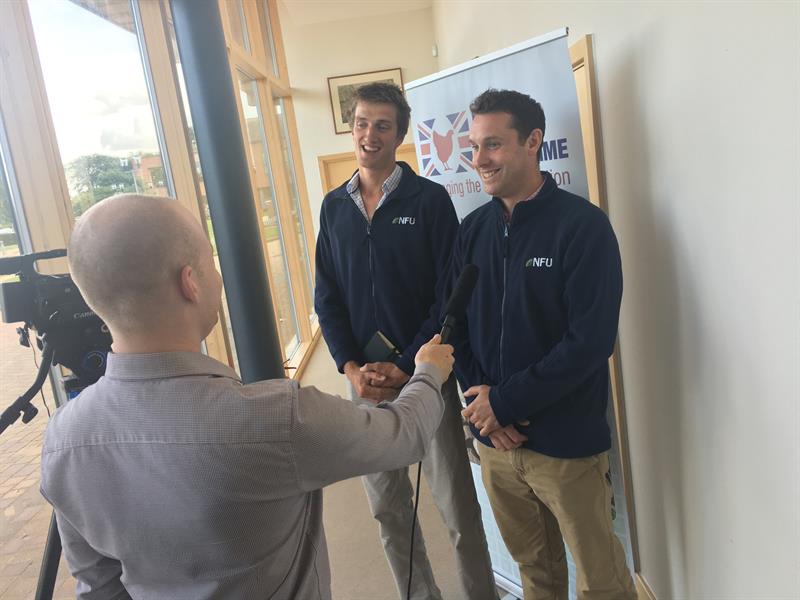Welcome to the fourth cohort on the Poultry Industry Programme (PIP) run by the NFU in partnership with ABN. I have been given the task of kicking off the PIP reports by setting the scene and updating everyone on what the first couple of days were all about.
To give you an insight into my background, I am from a small family farm in Shropshire which consists of free-range layers. I primarily work for Country Fresh Pullets as a Rearing Production Manager and Audit Manager for Lloyds Animal Feeds since graduating from Harper Adams University in 2017.
Meeting like-minded peers
The PIP interested me as I wanted to meet likeminded peers in the industry across all sectors of poultry production. The aim is to further my knowledge of all aspects of the industry and share my own experiences to such a progressive group of people.
The PIP was launched at NFU HQ in Stoneleigh with James Mottershead (PIP Chair) and Aimee Mahony (NFU Poultry Adviser) who are both great ambassadors for the industry.
Diverse backgrounds
Now for an overview of what we did on our first encounter as a group of farmers from all over the country.
We all realised that we have very diverse backgrounds from one another even though we are all within the same industry and we managed to identify and discuss the challenges and opportunities across all poultry sectors. We did this throughout the first two days across many debates and this is something I’m sure we will continue to do over the next 12 months and beyond.
Challenges and opportunities
I personally found that as farmers we are very quick to highlight any challenges within the industry or that of our own businesses. However, we are much slower to acknowledge and address any opportunities. I like to be portrayed as a positive person and believe that with every challenge becomes an opportunity, if you tear a challenge/problem apart there is often an element which presents an opportunity.
Following the introduction to PIP we had great talks from individuals within the NFU. Thomas Wornham (NFU Poultry board chair) spoke about the current aspirations in the industry such as becoming net zero and reinforced how widely spread the organisation is with 46,000 members at present. We also heard an interesting insight from Guy Smith (NFU Deputy President) on life as an officeholder.
Supporting agriculture
This leads me onto the NFU itself and how the team of people support agriculture and the work they do on behalf of the farming community. »ĘĽŇ»ŞČËfor example does in fact have a team of four people dedicated to BREXIT, trying to work out what it means for farmers collectively and addressing challenges and opportunities and presenting them to MPs to protect us all in the future. The aim is to analyse how a deal or no deal will affect farmers in the UK and try to find solutions on behalf of the industry.
A very new experience
The second day of the programme consisted of a very intensive full day of media training and for most of us in the group this was a very new experience.
In general, most farmers would shy away from the spotlight and camera however the future of farming is changing and the consumers of our produce want to feel closer to us and understand better what we all do.
For this reason, it is crucial to understand what to say in these situations as often we don’t put things across in the right way or say what we want to, which can be perceived wrongly.
Another string to the bow
I always say individuals cannot simply be good at everything. However, farmers in general are very much up there due to the fact they have to be stock people, business people, vets and much more, and media is yet another string to the bow.
Media training for me was an interesting activity where we all chose a current topic within the industry and carried out both live radio interviews and pre-recorded TV interviews. I think it would be fair to say on behalf of everyone participating it is a valued experience.
Vital aspects affecting businesses
The PIP will involve trips to Europe and the Houses of Parliament in London, to name but a few, and the visits, training and events will cover vital aspects affecting our businesses. We have also been tasked with collectively organising an event to engage young people into the ageing industry.
Please follow the PIP reports which will include articles, vlogs and tweets over the next twelve months and keep a look out for any updates on our progress. Our next meeting is in October and we will be completing leadership training and a visit to an egg processing business. Another member of the PIP cohort will be completing a report after the visit and I hope you enjoy following the group over the course of the next 12 months.
